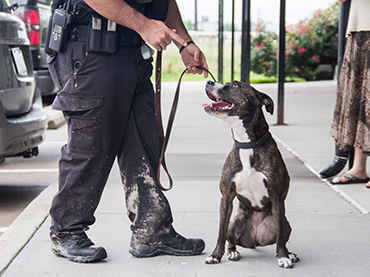- Sections :
- Crime & Public Safety
- Restaurants & Food
- Sports
- More
From rags to riches: Local pit bull escapes death row, becomes Deputy K-9

MONTGOMERY COUNTY, Texas — Death was knocking on Libby’s door when Marcia Piotter, President of Operation Pets Alive, took her in. Now, the pit bull rides to the shelter where she was scheduled to be euthanized years ago as a working Deputy K9.
When Piotter got out of her vehicle, Libby greeted her former foster mother with joy. Understanding Libby’s loyalty to people, Piotter was nervous about seeing her for the first time because she didn’t know if she had completely transferred to someone else or if seeing her again would distract her from work.
“It was pure Libby just living in the moment: very glad to see you, and then right back to the next thing on her agenda,” Piotter said. “It feels good when you’re able to place somebody in a place you feel right about for them.”
Libby was once on the shelter’s list to be euthanized, so Piotter stepped in and decided to foster the pit bull.
“She was on a list. She was a little dog that grew up in a shelter that was going to be euthanized, and we look at them all the same—everyone on that list we treated just the same and tried to do what we could do with them all,” Piotter said. “That’s what we do.”
At an adoption event in 2013, a local pit bull owner took notice of Libby. The owner’s own dog, Lily, is a therapy dog and pit bull advocate for the community. Knowing that Operation Pets Alive doesn’t typically take pit bulls, Lily’s handler asked Piotter about Libby’s background and how she was acquired as a foster dog.
“She was in foster care with Marcia for about two and a half to three years, and I sort of kept an eye on her and wondered where she would end up, and we both knew and had seen her ball drive and how energetic she is and believed she would make a great working dog,” Lily’s handler said.
As time passed, Lily’s handler saw her up for adoption several times and grew concerned that if Libby was placed with the wrong owner—even one with good intentions—she would just become another statistic. Lily’s handler said even a well-intentioned owner that can’t give a dog like Libby the right amount of exercise and enrichment can become a problem because the dog has a lot of energy that they can’t expend.
“We were just looking for her right fit. It’s kind of scary,” Piotter said. “When we get something that’s like the Michael Jordan of basketball and there’s no basketball court, what do you do with this character? You knew there was some serious talent there, but you’re looking for what game she needs to be in.”
After searching for the best fit, Lily’s handler determined that Libby might make a good working dog for a police department. Once she got Marcia’s blessing, Lily’s handler started contacting local police officers and agencies. She hit a lot of dead ends until she found Brad Croft from Universal K-9 in San Antonio. Several phone calls later, she finally got a hold of him.
“I knew that Brad was out in the field most of the day working with dogs, and training and working with officers that he was also training, so I just kept trying,” Lily’s handler said. “A couple of months later sort of a last ditch effort after not having heard back, I sent him a private message on Facebook a video of Libby, and to my surprise he responded back pretty quickly, and so at that point, we were in contact.”
Croft has trained over 150 dogs used by law departments nationwide. His dogs are double certified, and his staff has police and military backgrounds. He gets contacted about dogs often, and although he wants to help every dog he can, Croft said it’s not always possible. However, once he started receiving videos of Libby retrieving a ball, he noticed something that made him decide to work with her.
“While Libby was going to retrieve a ball in a thickly brushed area, an ambulance came by with sirens, and it was also raining and at night,” Croft said. “Libby just stayed on path, and I was amazed by that. A majority of them would have dropped the ball and ran.”
Croft knew Libby would be a success within the first week of working with her, and he determined she could employ her skills with a police department detecting drugs. Croft said he also knew that Libby didn’t need negative reinforcement to be trained.
“She doesn’t need spanking, she doesn’t need to be yelled at; if anything, she’d just lick you to death,” Croft said. “She’s a real pleasure to be around.”
When her training was done, Lily’s handler said Libby was going to be placed with a police department in either Missouri or Ohio. Then an opening became available for a K-9 Deputy with the Montgomery County Police Department. Libby was coming back home.
“When Brad called me and told me that she was coming back to Montgomery County, I just felt like I wanted to cry,” Lily’s handler said. “I knew how many hurdles we had crossed up until that point, how many times that road could have forked and could have turned the wrong way. I knew truly how fortunate we were for all the stars to have aligned for her to come back home in a good way — no longer as a stray, no longer as a homeless dog, but as a K-9 Deputy.”
Libby’s training costs were fully donated by Croft, Lily’s handler covered the cost for the two week course for Libby’s handler, and OPA and other donors covered a weekend-long handler course. Usually law enforcement departments purchase the potential K-9 Deputy from breeders that sell certain breeds of dogs to police departments. They often spend $10,000 to $15,000 for a pure bred dog and sometimes an additional $10,000 to $15,000 for training. Libby didn’t cost the department anything.
Lily’s handler said she thinks it’s a good issue to present to tax payers because of varying priorities departments have and their associated costs, especially since several law enforcement departments are now looking to get body cameras. Libby being donated to the department means they could save money and put it towards something else and have both needs met.
“The work that Brad is doing is really beneficial to the community and to tax payers in general because by taking a rescue shelter dog, you’re not only saving a life, but he’s donating these dogs,” Lily’s handler said.
Libby’s popularity has grown not only within Precinct 4 of the Montgomery County Police Department, but also within the community as well. Libby’s handler, Deputy Jesse Bullinger, said that everyone loves that she’s working in the county getting drugs off the streets.
“Everything as a whole has been amazing—the department getting a dog at no charge and everything else, and then her personality on top of that was just a bonus,” Bullinger said. “She’s been a great dog. Everybody is excited to see her out there working.”
Libby has made several busts during her employment with the Montgomery County Police Department, including the shut down of a drug house located next to a daycare center and behind an elementary school where there were drugs disguised as candy, loaded weapons and other illegal items found in a child’s room.
In addition to getting drugs off the streets, Libby is showing the community that stereotypes of certain breeds of dogs are not necessarily true.
“Pit bulls have a lot of negative connotations in regard to their demeanor and everything, but the more and more we hang out and know Libby better and understand the breeds, it’s becoming a fact that it’s the owners that are making the dogs into what they are,” Bullinger said. “You can turn any dog mean, but people like doing it to pit bulls because they’re a tough looking dog.”
Lily’s handler hopes that people will begin to look at pit bulls and give them a chance because there are so many of them being placed in shelters. Many people believe this is because nobody wants them, and they don’t make good family pets.
“Nothing could be farther from the truth,” Lily’s handler said. “There are a lot of pit bulls in the shelters because of breed specific legislation, because of landlord or residential rules prohibiting them. A lot of insurance companies won’t provide homeowner’s insurance or property insurance if you own a certain breed of dog.”
Several advocates are aiming to change society’s attitude towards commonly stereotyped breeds through educating the community on dog treatment and safety. Lily and her handler go to The Woodlands Children’s Museum to give presentations to kids on how to interact with all dogs, and the children get to practice with Lily.
“We teach them what to do around stray dogs and not to scream and not to run,” Lily’s handler said. “We teach them about general respect towards animals and how typically anything we wouldn’t like is something they wouldn’t like, and also reporting animal cruelty.”
Libby and Lily are just two examples of pit bulls that are working with the purpose of benefitting the community. Those involved in their training and advocacy all have the common goal of saving lives and serving other places across The United States. Croft, for example, said he’s aiming to bring awareness that stereotyped breeds are not bad dogs.
“It doesn’t take a German Shepherd or your typical police dog to do this work,” Croft said. “I want to continue to bring this awareness to people so that we can continue to save these dogs and to make a better environment for everyone and everything. I hope dearly to my heart that it’s a win-win-win for everyone.”
For more information about Libby, Lily, Operation Pets Alive, and Universal K9, visit the corresponding links provided below.

















